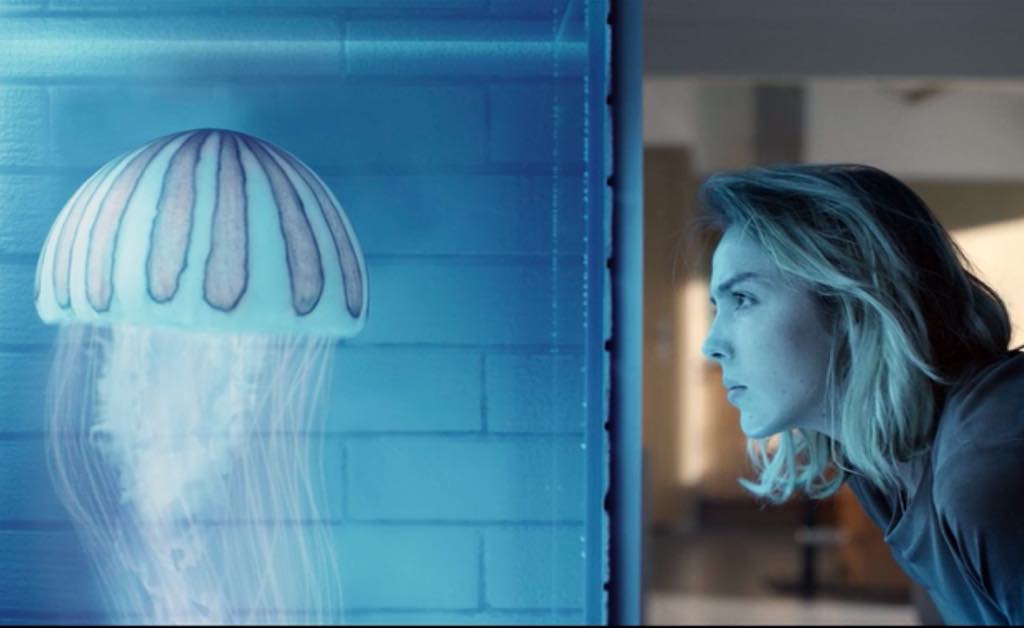
In the 1980s, a chance discovery revealed that a species of small jellyfish, Turritopsis dohrnii, which self-regenerates and never reaches maturity, is biologically immortal. This process is currently being studied by many groups of scientists around the world with a view to extending the human lifespan. In his 2019 book Lifespan: Why We Age and Why We Don’t Have To, David Sinclair shows how aging might well become a thing of the past thanks to current efforts in drug discovery and development, gene analysis and biotracking.
This possibility underpins the French science-fiction show Ad Vitam, a six-episode series released in 2018 by Arte (available on Netflix since June 2019). The show opens in the future – not very different from our own world – with media footage of the international celebration of the 169th birthday of the world’s oldest person, a Japanese woman called Setsuko Kashiwara. Two photos of her, one taken when she was 23 and another at 169, are shown side by side; she looks identical in both.
Cut to a bar, where a man named Darius Asram (Yvan Attal), is chatting up a younger woman. He looks to be in his 50s, and she in her 30s. They are playing the timeless game of guessing each other’s age, but the scenario loses its familiar feel when it transpires that he is 119 and she is 63. The two strangers hook up. In the morning, a reveler dressed as a jellyfish who had walked past them in the bar sees the corpses of several young people float by when he urinates in the sea.
Darius, who turns out to be a police captain, is called upon to investigate this mystery. The rest of the series focuses on the quest for a solution, underscoring the deep-seated affinities between science fiction and detective fiction. The deaths seem related to a mass suicide initiated 10 years earlier by a pro-suicide cult (Ad Vitam deals with issues related to suicide and depression throughout the season). Darius enlists the help of Christa Novak (Garance Marillier), a young woman who was involved in the cult but did not go through with the atrocity and is incarcerated in a mental-health facility.
The show is visually mesmerizing, with its red and blue lighting and the recurring jellyfish motif – we learn that the creature was the source of the medical regeneration that enables people to effectively live forever.
The sleek world of the series, reminiscent of our own yet removed from it, pays homage to Gattaca (1997), an American sci-fi movie that dealt with the implications of genetic manipulation, and also evokes Jean-Luc Godard’s science-fiction detective feature Alphaville (1965), a reminder of France’s sci-fi heritage. The setting is never identified but looks like the Riviera; in fact, the show was filmed on the Spanish coast around Benidorm.
Ad Vitam pays the ultimate accolade to the viewer by rarely explaining anything: we have to work out for ourselves the effects of longevity on humans, and there are many. One is the great number of disaffected young people since jobs can be held almost eternally by their elders. Also, the age of majority has been increased to 30. We see brief allusions to a pending referendum on strict population control, which is passed with 88 percent of votes in the last episode. Children seem to be an avoidable nuisance, and there is little need for heirs and successors in a world in which death has become an anomaly.
The show’s real strength lies in the dynamic between the two central characters. Darius calls to mind Columbo’s almost-handsome looks and carefully cultivated casualness, while Marillier as Christa gives an astonishing performance that projects both fragility and strength. There is no suggestion of a sexual subtext between the two and, in fact, Darius becomes increasingly paternal toward Christa, whose real parents seem sorry that she was born.
In one poignant scene, Darius – for whom this is his last case since retirement from the police force is mandatory after 99 years of service – wonders why someone as sharp-witted and cynical as Christa would ever get involved with a cult (the answer is love), while she probes him about the great void in his life, the loss of his only child to a pandemic years earlier, when rejuvenation technology was in its infancy. These two individuals who have been thrown together help redeem each other and bring out each other’s inner probity.
Ad Vitam is one of those rare shows that benefit from a second viewing. The last two episodes are extraordinary pieces of television, with Episode 5 presenting the perspective of the cult leader, Caron (Niels Schneider), who becomes Virgil (names are significant in the show), prompting us to re-evaluate preceding events and affording some insight into and perhaps even sympathy for the character.
The prospect of living forever is appealing, but the series shows us what the greatest danger of such a prospect is: boredom. The ending is both horrific and hopeful.
Ad Vitam has not garnered much attention, which is a shame as it is in every respect a great series, one that demonstrates that both French television and French sci-fi have come of age.
Favorite